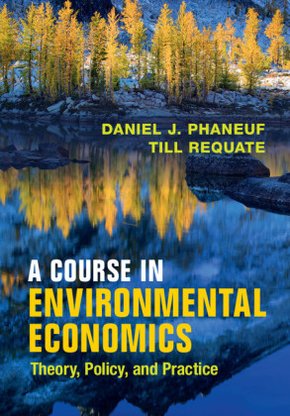A Course in Environmental Economics - Theory, Policy, and Practice
| Verlag | Cambridge University Press |
| Auflage | 2018 |
| Seiten | 792 |
| Format | 17,9 x 25,5 x 4,1 cm |
| Gewicht | 1403 g |
| Artikeltyp | Englisches Buch |
| ISBN-10 | 052117869X |
| EAN | 9780521178693 |
| Bestell-Nr | 52117869EA |
This graduate text provides a compelling narrative of current environmental economics that integrates theory, policy, and empirical topics.
This unique graduate textbook offers a compelling narrative of the growing field of environmental economics that integrates theory, policy, and empirical topics. Daniel J. Phaneuf and Till Requate present both traditional and emerging perspectives, incorporating cutting-edge research in a way that allows students to easily identify connections and common themes. Their comprehensive approach gives instructors the flexibility to cover a range of topics, including important issues - such as tax interaction, environmental liability rules, modern treatments of incomplete information, technology adoption and innovation, and international environmental problems - that are not discussed in other graduate-levels texts. Numerous data-based examples and end-of-chapter exercises show students how theoretical and applied research findings are complementary, and will enable them to develop skills and interests in all areas of the field. Additional data sets and exercises can be accessed online, providing ample opportunity for practice. For more information, visit the book's website at http://phaneuf-requate.com/.
Inhaltsverzeichnis:
Part I. Economics and the Environment: 1. Environmental economics and the theory of externalities; 2. Environmental problems and policy issues; 3. Introduction to the theory of environmental policy; Part II. The Design of Environmental Policy: 4. Imperfect information; 5. Competitive output markets; 6. Non-competitive output markets; 7. Environmental policy with pre-existing distortions; 8. Institutional topics in cap and trade programs; 9. Ambient pollution control; 10. Liability; 11. Innovation and adoption of new technology; 12. International environmental problems; 13. Accumulating pollutants; Part III. Valuing the Environment: 14. Theory of applied welfare analysis; 15. Revealed preference models; 16. Discrete choice models; 17. Recreation; 18. Property value models; 19. Stated preference methods; 20. Health valuation; Part IV. The Practice of Environmental Economics: 21. Cost-benefit analysis: modeling; 22. Cost-benefit analysis: empirical; 23. Final thoughts.
Rezension:
'Mature fields in economics have a foundational text that frames graduate students' understanding of what has been established and where new research is needed. With Phaneuf and Requate's new text, environmental economics has its foundational text! This is the first text that spans the full domain of modern research and practice in environmental economics. The authors have succeeded in defining how the field will be perceived by all economists and perhaps more importantly how the next generation of environmental economists can advance it.' V. Kerry Smith, Emeritus Regents Professor, Arizona State University, Tempe

